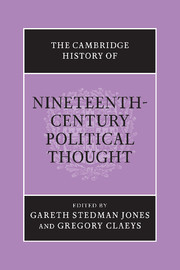Book contents
- Frontmatter
- Contents
- Contributors
- Acknowledgements
- Introduction
- I Political thought after the French Revolution
- 1 Counter-revolutionary thought
- 2 Romanticism and political thought in the early nineteenth century
- 3 On the principle of nationality
- 4 Hegel and Hegelianism
- 5 Historians and lawyers
- 6 Social science from the French Revolution to positivism
- 7 Radicalism, republicanism and revolutionism
- II Modern liberty and its defenders
- III Modern liberty and its critics
- IV Secularity, reform and modernity
- Biographies
- Bibliography
- Index
4 - Hegel and Hegelianism
from I - Political thought after the French Revolution
Published online by Cambridge University Press: 28 July 2011
- Frontmatter
- Contents
- Contributors
- Acknowledgements
- Introduction
- I Political thought after the French Revolution
- 1 Counter-revolutionary thought
- 2 Romanticism and political thought in the early nineteenth century
- 3 On the principle of nationality
- 4 Hegel and Hegelianism
- 5 Historians and lawyers
- 6 Social science from the French Revolution to positivism
- 7 Radicalism, republicanism and revolutionism
- II Modern liberty and its defenders
- III Modern liberty and its critics
- IV Secularity, reform and modernity
- Biographies
- Bibliography
- Index
Summary
Problems of interpretation
Seen from a broad historical perspective, Hegel's political philosophy, as expounded in his 1821 Philosophie des Rechts, was a grand synthesis of all the conflicting traditions of the late eighteenth and early nineteenth centuries. Its theory of the state wedded liberalism with communitarianism; its doctrine of right fused historicism, rationalism and voluntarism; its vision of ideal government united aristocracy, monarchy and democracy; and its politics strove for the middle ground between left and right, progress and reaction. Such an account of Hegel's achievement is not an ex post facto rationalisation; it is a simple restatement of his intentions. For Hegel saw himself as the chief synthesiser, as the last mediator, of his age. All the conflicts between opposing standpoints would finally be resolved – their truths preserved and their errors cancelled – in a single coherent system. The power of Hegel's political philosophy lay here, in its syncretic designs, in its capacity to accommodate all standpoints; any critique of the system, it seemed, came from a standpoint whose claims had already been settled within it.
- Type
- Chapter
- Information
- The Cambridge History of Nineteenth-Century Political Thought , pp. 110 - 146Publisher: Cambridge University PressPrint publication year: 2011
- 4
- Cited by



